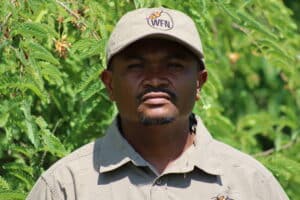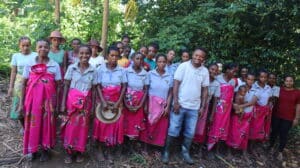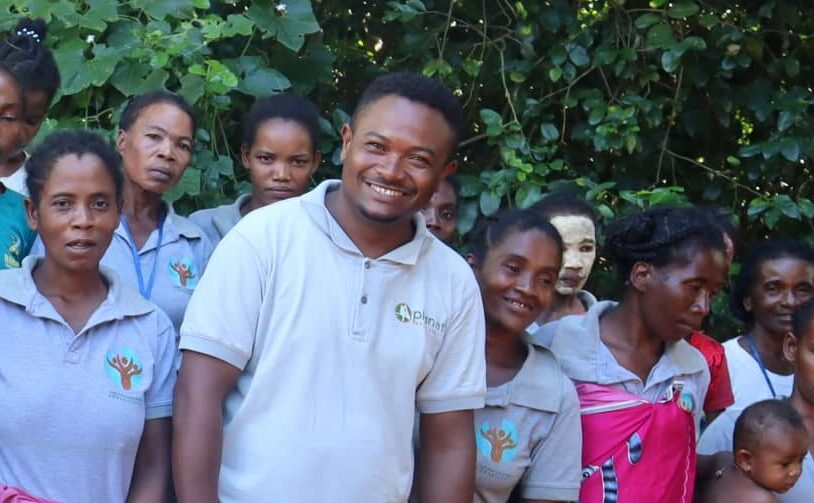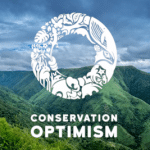Welcome to a special edition of “Meet the Optimists”, featuring winners of the 2023 Whitley Awards. Hear inspiring stories and advice directly from these incredible conservationists, and download Kids’ Corner resources relating to their work too!
Mamy Razafitsalama is the In-Country Director of Planet Madagascar and has a DEA degree in Primatology from the University of Antananarivo, Madagascar. He followed international training and courses about biodiversity conservation and monitoring in Mauritius and DESMAN (Durrell Endangered Species Management) in Jersey, UK. He is the recipient of a 2023 Whitley Award from the Whitley Fund for Nature.
Since 2015, Mamy has worked for Planet Madagascar implementing projects including fire management, forest restoration and community development. His research focused on Coquerel’s sifaka relations between mother lactating- infant behaviour with groups that live in tourist area and within the forest in Ankarafantsika National Park, Madagascar. His mission consists of saving endangered lemur species from extinction and improving the livelihoods of the local community in and around Ankarafantsika National Park.

Mamy Razafitsalama. [Photo by Whitley Fund for Nature]
Since I was young, I have been fascinated by animals. I had the opportunity to see lemurs close to the village where I grew up in Madagascar, close to the forest. I became interested especially in nature and conservation during my undergraduate studies at the University of Antananarivo in 2006, when I learned about how lemurs are the most endangered group of animals in the world.
In 2010, we conducted research on the impact of forest fragmentation on lemurs survival and richness in Ankarafantsika National Park with Dr. Travis Steffens. During that time, I learned about the key threats to lemurs, including habitat loss and hunting, as well as the difficulties faced by the nearby human population.
That fieldwork triggered me to take part in saving lemurs from extinction, protecting their natural habitat while improving the lives of local communities. That moment ultimately led to Planet Madagascar, where I have been the In-Country Director since 2015.
Tell us about a challenge that you faced, and how you overcame it.
Conservation in a “least developed” country is very challenging because people struggle to find food and rely mostly on natural resources to survive. People in Madagascar live under poverty that leads the rural community to clear land for agriculture or collect NTFP (Non-Timber Forest Products). Habitat loss from fire and farming are the most significant threats for biodiversity in Ankarafantsika National Park, caused by local communities that live under extreme poverty. Working for conservation means needing to think about people as well.
To overcome this issue, we work closely with the local community for all stages of our project: from the conception to the implementation and follow up. This means that we work together. We hire only from the local community, and meet with local stakeholders for project updates. In one sentence, we try to find solutions for both wildlife and humans.

[Photo by Whitley Fund for Nature]
In 2018 we ran out of funds and had difficulty running our fire management project, however our fire management team still continued their work on their own without getting paid for a few months. This showed a sense of ownership and I realised that there is behaviour change within the community which is very important in conservation.
What is your vision for the future?
I hope that the biggest threat to biodiversity in Ankarafantsika National Park, which is habitat loss from multiple factors such as fire and land clearing, will be reduced by 50% in 15 years while wildlife and humans thrive together.
What keeps you optimistic about the future of nature?
Ankarafantsika is a well-known tourist site because it is home to many different species of lemurs and birds that are only found in Madagascar and nowhere else. People will travel all around the world to see the uniqueness of Madagascar, especially Ankarafantsika National Park, which means that there is still hope for the improvement of tourism that leads to the improvement of the local community’s income.
Also, as an organisation we will keep continuing our work on biodiversity conservation, and that gives me hope.
What is the “pearl of wisdom” that you would hand on to a budding conservationist?
For me, the exchange with the local community that lives in a different situation than me helped me understand the reality that we faced in conservation in Madagascar.


